polling
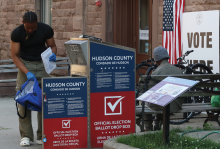
POLL WORKERS ARE everyday people, who are well trained in the process, who step up and serve their communities. Poll workers and election officials at all different polling locations have very strict guidelines on how to handle the equipment and the ballots. You can see these people, in real time, handling these things effectively and following the rules.
Both as a democracy advocate and as a Christian, I put a big value on honesty and on the truth. A democracy needs well-informed people who understand what the truth is, and we need leaders who make decisions based on the truth.
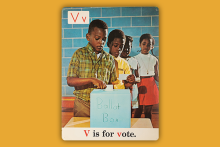
I PROUDLY SHARE the legacy of generations of people who fought to be respected as full citizens in America. I am the granddaughter of Mississippi sharecroppers. My parents picked cotton growing up, sometimes missing school to ensure the family could make ends meet. My parents left Mississippi in the late 1960s after college, having never voted. I know too well about voter suppression and the horrors of Jim Crow. The fundamental right to vote is close to my heart; it’s personal.
My generation was the first in my family born with full voting rights. I never thought the precious right to vote would be jeopardized in 2024. Yet, because the Supreme Court gutted the Voting Rights Act in 2013, the right of full and safe access to the ballot box is again impeded. Voter suppression has again taken hold as a tactic for dismantling democracy. The ghost of Jim Crow keeps on haunting.
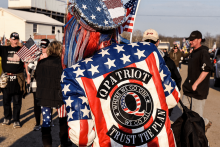
About one in five Americans mostly agree with ideas consistent with the QAnon conspiracy theory, according to a new survey from the Public Religion Research Institute. That’s an increase from one in seven since last year.
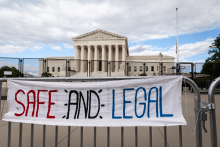
As the country awaits the Supreme Court decision on federal abortion rights in Dobbs v. Jackson — which many expect will overturn Roe v. Wade — politicians, activists, pollsters, and news outlets are highlighting polling on abortion.
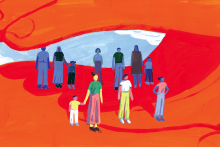
WHO WOULD HAVE thought that a verse from the first chapter of the Bible would become an “altar call” for a presidential election? Here is our call to faith as we look to Nov. 3: “Then God said, ‘Let us make humankind in our image, according to our likeness.’ ... So God created humankind in [God’s] image” (Genesis 1:26-27).
I believe this text about the creation of humankind in God’s likeness is the foundation of politics for people of faith. It means how we treat other human beings, including our fellow citizens, is a theological matter and not just a political one. Mistreatment of our fellow human beings and citizens is also not just a political problem but an offense to the image of God, an assault on imago dei.
Protecting the image of God in the upcoming election means protecting the voting rights of Americans of color, whose votes some are trying to suppress, deliberately and strategically. The faith community is responding.
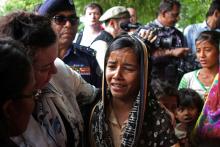
Of the 43 percent who do not believe the U.S. has a responsibility to accept refugees, polling showed that no group agrees less with that idea than white evangelical Protestants, at 68 percent.

White evangelical Christians, a crucial bloc of Republican voters, are backing likely GOP presidential nominee Donald Trump by a wide margin over Hillary Clinton but their support is significantly lower than for previous Republican candidates.
That relatively tepid faith-based endorsement could wind up undermining Trump’s chances for victory in November.

Growing conservative disaffection with Pope Francis appears to be taking a toll on his once teflon-grade popularity in the U.S., with a new Gallup poll showing the pontiff’s favorability rating among all Americans dropping to 59 percent from a 76 percent peak early last year.
Among conservatives the dropoff has been especially sharp: just 45 percent view Francis favorably today as opposed to 72 percent a year ago.
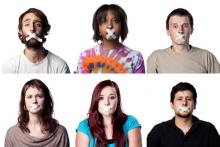
Young millennials — age 18 to 25 — are more comfortable with an evangelical than Mormon (or atheist or Muslim) president. This, according to part two of the Millennial Values Survey put out by the Public Religion Research Institute and Georgetown University’s Berkley Center.
Nearly six in 10 of those surveyed say they would be comfortable with an evangelical Christian serving as president, while 44 percent would be comfortable with a Mormon.
The numbers line up with those supporting President Barack Obama over Gov. Mitt Romeny at 55 percent to 39 percent — a spread that has actually increased 16 points since March.
But that won’t necessarily convert into votes. Nearly two-thirds of those surveyed are registered to vote, but only half report they are absolutely certain they will cast a vote in November.
The candidates’ religion isn’t the only factor affecting young peoples’ voting patterns. Another issue is a lack of voter engagement in the political process altogether.
“Millennials have a reputation for being the ‘wired’ generation, but when it comes to government, they’re unplugged,” said Daniel Cox, PRRI research director, in the news release Friday. “Across a range of measures, younger millennials indicated that they are disillusioned with the government’s ability to respond to their needs.”
They may not be as large as Catholics or as active as evangelicals, but white mainline Protestants have a big thing going for them this election cycle: they are divided, and possibly persuadable.
That's according to a new poll released today (2/2/12), which found white mainline Protestants are more evenly split between President Obama and his Republican challengers than other religious groups.
"They're the most important ignored religious group in the country," said Dan Cox, research director at the Public Religion Research Institute, which conducted the poll in partnership with Religion News Service.
In a matchup between Obama and GOP front-runner Mitt Romney, mainline Protestant voters are nearly evenly divided, with 41 percent supporting Obama and 43 percent for Romney. The same holds true between Obama and former House Speaker Newt Gingrich — each is the choice of 41 percent of white mainline Protestants.